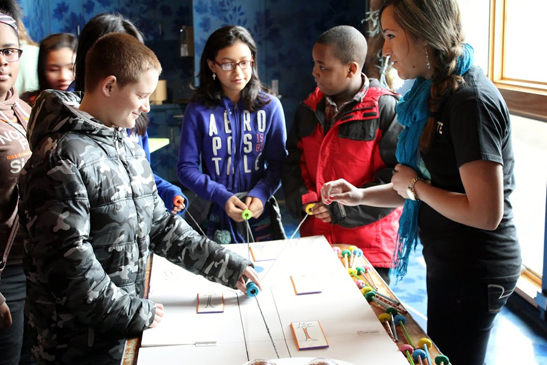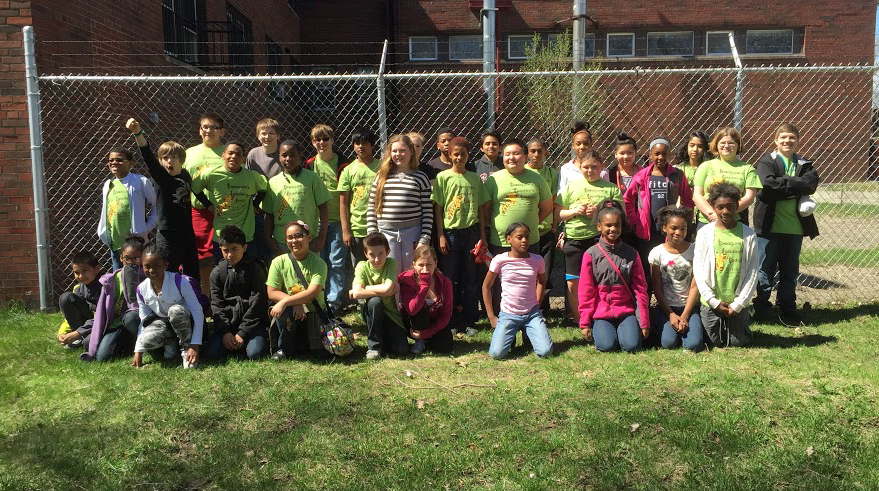 |
Recipient: Detroit Zoological Society - Royal Oak, MI Program: Museums for America - Engaging Communities Web Site:
|
Contact: Margaret Casazza, Education Specialist
|
Pictured above: The Detroit Zoological Society’s Tomorrow’s Leaders Today program participants explore science concepts in hands-on, interactive workshops.
|
“Middle school is a time when a lot of children lose confidence in their science and math abilities. Through this program, we reengage them in ways that not only build their confidence but inspire them to look to new career paths. It’s wonderful to watch that light-bulb moment where we can capture their imagination and inspire them so they that see science careers aren’t just for ‘old men in lab coats,’ but discover all of the possibilities that are available to them.” – Diane Miller, Chief Program Officer, Detroit Zoological Society |
For the past four years, a select number of lucky students await the start of October and their participation in the Detroit Zoological Society’s Tomorrow’s Leaders Today (TLT) program where they engage with zoo-inspired science, technology, engineering and math (STEM) education. Through hands-on learning, TLT opens the eyes of its participants to the possibility of careers in life and earth sciences, animal welfare, wildlife conservation, microbiology, veterinary medicine, and other exciting fields. Sparking a connection with students’ daily studies and the world we live in, TLT illuminates for its participants how that connection can lead to meaningful STEM college opportunities and career paths.
Monthly Workshops: Major Learning
With a focus on fifth-through-eighth grade students in underserved communities throughout the Detroit Zoological Society’s primary service area, TLT reaches students and their teachers through a series of seven workshops over the course of a school year. Workshops span subjects such as animal behavior and welfare, sustainable living, and habitat design, all while exposing program participants to the world of science through hands-on learning experiences. With all that the Detroit Zoo and surrounding communalities have to offer, TLT breaks from the mold of a stereotypical “zookeeper,” and exposes students and their teachers to the many zoo-inspired STEM pathways available to them.
TLT focuses primarily on three impact categories: fostering awareness, knowledge, and understanding; engagement or interest in STEM careers; and building skills that will prepare students to pursue STEM higher education and careers. Within these categories, students develop new understandings of the STEM career and college opportunities, and connections between their coursework and the real world. Through a wealth of activities with real-life applications, be it hands-on computer coding projects, conducting water quality assessments in local lakes and river inlets, or designing and building 3-D animal habitat models, TLT both inspires and prepares students for fulfilling careers they might not have ever imagined.
Beyond Students
It isn’t just TLT students who are developing their skills. Their teachers also engage in workshop activities and foster their professional development by stepping into a fresh learning environment. Indeed, TLT is designed to help participating teachers increase their awareness of educational resources and build their skills in using inquiry-based STEM instruction in their own classrooms.
Another important component of TLT is its student/parent orientation session, hosted at the beginning of each year to provide an introduction to program goals, expectations, and content. During the orientation, parents are offered a “Strategies for Paying for College” workshop that addresses one of the major barriers to higher education for participating families: financial need. Meanwhile, students are provided with a journaling workshop where they are introduced to this valuable skill for recording field observations as well as capturing their experiences and discoveries while participating in TLT activities.
The journal component of TLT flourishes over the course of the program, with time allotted for journaling in each workshop. Not only do students learn to record data and other observations, they also develop more meaningful relationships with TLT education staff who respond to each journal entry every session, ensuring each student feels they have a voice in the program.
This has proven to be a valuable source of feedback for what is working and how to best reach participants. “I’ve enjoyed my time being here, I have learned some things that can help me with the wild life. I can’t wait till I go home and tell my parents about what I saw and learned,” one student reflected in their journal.
Seeing the Possibilities; Touchstones in the Community
In addition to behind-the-scene tours of Detroit Zoo facilities and conservation field work, TLT participants explore their communities through multiple field trips over the course of the program, including a special visit the Michigan State University College of Veterinary Medicine (MSU-CVM). This trip allows TLT students to work side by side with MSU-CVM students who bring the prospects of pursuing a STEM career to life. While visiting MSU, TLT participants take part in activities around animal health like “puppet suturing,” which teaches students basic stitching and knot tying using stuffed animals, yarn and a needle. Meeting people who are pursuing their higher education inspires and demonstrates to TLT students that they can do the same.
TLT participants also have the opportunity to support their community through field trips to local organizations doing inspiring work. One such trip involved a visit to the Cass Community Social Services (CCSS), where students join in the organization’s repurposing of illegally dumped tires from Detroit, transforming them into flip flops and mud mats for sale, and employing and empowering formerly homeless people in the process. TLT students deeply connected with this experience, as evidenced in their journal entries. One wrote, “I like that this organization offers jobs to people who would otherwise not have one.”
 |
| Photo caption: TLT students on a field trip to Cass Community Social Services, a local green and social justice organization. |
Proven Results
Both empirical and anecdotal evidence reveal how TLT is making a difference. Teachers notice that their students leave the program with increased confidence, and are much more likely to take on leadership roles in classroom activities. Surveys of participants also show that TLT students can both describe highly specific, new science content that they learned during the program, as well as name specific career information and explicitly link to careers they might pursue. In one annual IMLS evaluation of TLT, an interviewed teacher summarized these results succinctly; “I appreciate the focus on high level science careers that is provided to these kids. They need to be pushed like this and to have goals held up for them to aspire to.”
Teachers, parents, and students themselves all agree that TLT has been as popular as it is rewarding. Indeed, after the three-year IMLS grant expired, the Detroit Zoological Society secured an extension for another year of the program to run though May 2016, a testament to its rich offerings and strong results.